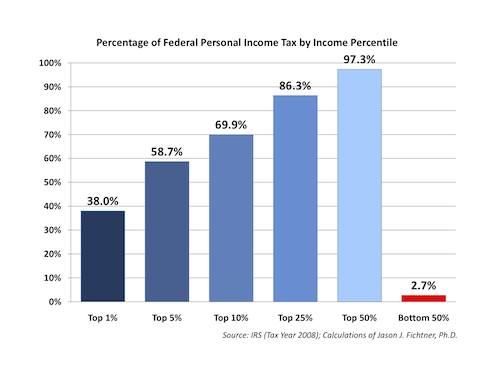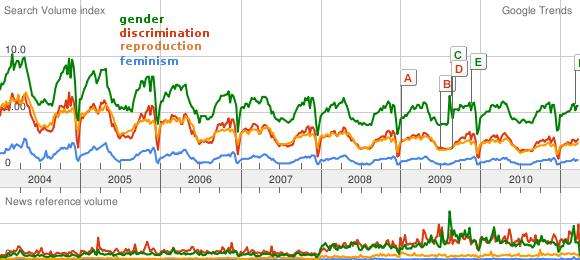Liberals tend to fall for the false consensus effect, and conservatives tend to fall for something that could be thought of as its opposite.
This is an important observation, I think, so indulge me a few paragraphs to explain it. We have people who do real work, and people who don’t. Overall, you’ll find people who do work have a tendency to — as they said when we were growing up — “see what needs doing and get it done.” People who don’t work tend to bitch about what someone should do, wait until someone gets it done, and then contribute a bunch of “ideas” in some big gab-fest about where the product of the work should go. That’s what post-industrial-revolution liberalism is: Non-producers making rules about what should be done with the items of value produced by producers.
Where we’re at, now in the age of the Tea Party, is the producers have again been reminded that they can’t tune out of the political process and busy themselves with producing. So the producers, the conservatives, feel this conflict that is not felt by the non-producing liberals. Our inclination is to say “fuck this shit, I’ve got work to do”; kiss the wife & kids, go off to work, toil away, come home, pop open a beer, do our projects or watch teevee or whatever & go to bed. We put together our software or our bales of hay or our car parts or our pottery and figure that justifies our existence. But then the non-producing liberals come along and make their rules about what should be done with what we built. Or what should be done with the wealth generated by what we built. And so after we’ve built our things, or before we’ve built our things, or during, or wherever we can somehow manage to find the time — we must participate in this gab-fest about redistribution, and if we can’t manage to do that, the result is the same as if we never bothered to build anything.
Because that’s what really motivates our liberals. When you live out a non-productive life not actually creating anything of value, you don’t want anybody else to do that either.
Where the false consensus comes in, is: Our liberals are stronger when they make this common mistake — they congregate together and come to an understanding that “everybody” thinks the way they do. You hear this when a liberal politician makes a speech about American values. You know this part, you’ve heard it before, it’s where they start pulling things out of their butts and show us they have no clue what the Constitution actually says. They start off with this bastardized and corrupted reading of the fifth and sixth amendments…not about the speedy trial so much, but “innocent until proven guilty,” and then of course we’re going to make it harder every damn year to “prove” guilt, until the streets are crawling with violent criminals again. Then they meander from that to all the nonsense. Diversity. Yeah, it was Ben Franklin who thought to toss that one in, either him or James Madison. Open borders, lots of social programs, the rich should pay their fair share. Classically American values!
See, that’s false consensus at work. “Everybody in line-of-sight in this room agrees with me on this one thing; therefore, everybody with a pulse must agree with me on all other things.”
This opposite of false-consensus that hobbles the conservative mind, has to do with conjuring up a villain on some issues where, maybe there really isn’t one. And this is an important point, I think. We’re directing this energy toward the gab-fest on Facebook and on the blogs. We have all these other things we do where we’d rather be directing the energy, but experience has taught us we can’t do that and neglect the gab-fest because the end result of the gab-fest determines — dictates, unilaterally, I’d say — what will become of the fruits of our other labors. And it’s not too hard to pick up on the resentment we have over this conflict. We’re being painted into a corner, here, and dammit we don’t like that.
And so, I think, it’s important to develop a sense of looking at all the people who disagree with us, and figuring out who’s real and who is just an illusion. Our tendency has been…and this is the opposite of false consensus…to hear of some voice of someone who disagrees with us, and leap to the assumption “that is a real person speaking sincerely of his opinion and he represents God only knows how many millions of other dickheads.” We need to be leery of this. There are too many talking points out there being regurgitated.
Yes, I’m speaking of Astroturfing. To read the Wikipedia article on Astroturfing and skim the Recent Examples (political) section, you’d think the progressive side never does it, ever. This has been a very silly situation with that page that has been going on for quite awhile. Read up on the “Ellie Light” situation. Wikipedia editors and admins are well-intentioned, honest folks — except when they’re not.
Heck, just listen to what some of the supposedly real people have to say. The woman who interrupted Lou Barletta’s town hall meeting for example —
While he was going through a slide projector presentation about the Medicare changes proposed by House Budget Committee Chairman Paul Ryan (R-Wisc.), a woman raised her hand.
“Excuse me, I’d like to get something off my chest,” she said, standing. “You seem to think that because I’m not effected [sic] I won’t care if my niece, my grandson, my child is affected. I do care. What you’re doing with this Ryan budget is you’re taking Medicare and changing it from a guaranteed health care system to one that is a voucher system where you throw seniors on the mercy of for-profit insurance companies.”
“You said nothing in the campaign about I’m going to change Medicare, now you voted for a plan that will destroy Medicare,” Linda Christman, 64, said. Christman is president of the Carbon County Democrats for Change, according to Barletta’s office.
A concerned citizen who happens to be a democrat activist? Or a democrat activist who happened to have some time to turn the town hall into a circus? You be the judge of that…but these cliches are dishonest. “Throw seniors on the mercy of for-profit insurance companies.” That might get a “real” citizen excited, but it’s not an honest expression of real-citizen concerns. Real citizens are concerned that their nieces (that’s the next generation), children (next generation) and grandchildren (two generations forward) won’t enjoy some absolute, unconditional guarantee from the government that we can’t afford as of right now anyway?
That’s bullshit. Plants and puppets. Puppets and plants.
One of my favorite examples of this, lately, is all this polling that says the public supports public sector unions over Wisconsin Gov. Scott Walker. You know the drill…
As labor battles erupt in state capitals around the nation, a majority of Americans say they oppose efforts to weaken the collective bargaining rights of public employee unions and are also against cutting the pay or benefits of public workers to reduce state budget deficits, according to the latest New York Times/CBS News poll.
:
Americans oppose weakening the bargaining rights of public employee unions by a margin of nearly two to one: 60 percent to 33 percent. While a slim majority of Republicans favored taking away some bargaining rights, they were outnumbered by large majorities of Democrats and independents who said they opposed weakening them.
Riiiiight. Because if there’s one classically American value that really counts for something, it is that nobody who is a member of a union should ever feel the effects of a recession, ever. They shouldn’t have to wait for their raises even when the economy sucks, they shouldn’t ever have to worry about layoffs. Such indignities are for the rest of us. And after governments take some money away from us in the form of taxes so they can function as efficiently as possible, we need to have some other part of government, also funded with our tax dollars, to “negotiate” with…uh, somebody…so it all ends up being a jobs program that costs as much as it possibly can. Yeah, nobody has a peep of protest to offer against that except a bare majority of those extremist Republicans.
My other example is this drive to teach gay history in the public schools —
Over forty years ago, African Americans demanded public school districts and other educational institutions to reform their curriculum in order to reflect the experiences and histories of folks other than white men…in the years that followed, other ethnic groups and women would follow suit and push schools to revise their curriculum to be more reflective of United States history.
:
These battles over what and whom should be included in public school curricula are far from over; e.g., Texas State Board of Education approves revising textbooks to eliminate the civil rights movement, and Mississippi becomes the first state to implement a civil rights curriculum for grades K through 12. But it appears that public school curricula may undergo an entirely new makeover with the recent news that the state of California is close to becoming the first state to require the teaching of gay history.
According to the Associated Press, the California Senate approved the landmark measure a week ago, but it still needs to get a seal of approval from the Democratic-controlled Assembly and Gov. Jerry Brown’s desk. If the legislation is a success, lesbian, gay, bisexual and transgender people will be added to the lengthy list of social and ethnic groups that schools must include in social studies lessons. As early as the 2013-2014 school year, the California Board of Education and local school districts would be required to adopt textbooks and other teaching materials that would cover the contributions of LGBTs throughout history.
It is, of course, a stupid idea because the parallel does not exist. You conduct a class and say “Here’s Thomas Edison who invented the light bulb” and you’re not going to get too far before everyone can see this is a white guy. And so if we grant the black-history argument every conceivable advantage, then we eventually acknowledge, alright if you’re a black kid you might feel a sense of estrangement that doesn’t apply to the white kids.
But you’re probably not going to cover the fact that Thomas Edison was straight. I mean, he was, wasn’t he? Gee, I don’t even know that for sure. In all my learning about Edison, the subject simply never came up which is exactly my point.
But my other point on top of that point, is even more important: I don’t think there’s anybody I need to convince of that. Who’s really for LGBT history month? Who’s pushing this? A bunch of well-intentioned but mistaken liberal dipshits who could be my co-worker or my neighbor? Doubt it. Yes, it passed the Senate. Gov. Brown would sign it if it landed on his desk; of that I have no doubt. So yeah it could become law.
But I don’t think anybody’s being fooled by this turkey, anywhere. You have some “citizens” who are for it, but again, they aren’t uninvolved citizens. They’re egghead quacky docs and education professionals who stand to make money off the new curriculum.
This is a hazard that applies to conservatism that doesn’t apply to liberalism, since conservatism makes sense. All ideas, whether they make sense or not, must eventually find some opposition somewhere. And nothing really makes more sense than “it should be more lucrative to be a producer than a non-producer, not the other way around” — and — “if you subsidize something you’ll get more of it, if you tax something you’ll get less of it.” Those ideas make so much sense that nobody should be disagreeing with them. But, since they are ideas, someone, somewhere, will.
But that doesn’t mean those are real people. They’re plants. We’re living in the age of the plant. The whore who is paid money, or recruited as a volunteer, to pratfall and faint when Barack Obama makes a speech. It is a reaction, I think an expected one, to this recent development of blogs and social media and the Tea Party. Since the liberals have monopolized the previously-mentioned gab-fest about where the fruits of labor should be directed, and the producers have understood they need to mount a resistance at that gab-fest, a fierce battle now takes place on that hilltop. Both sides perceive that this tiny plot of land holds premium strategic value, and both sides are correct about this. They’re trying to get the first word and the last word.
Liberal non-producers are engaged in this battle because of their natural instincts, whereas conservative producers are engaged under protest. We are very much like the founding fathers rushing off to the battlefield, or off to the halls of Congress, wondering if the wife & kids can look after the farm in our absence. We’re conflicted by that, and furthermore, we don’t like to think some of our friends & neighbors are liberal jackasses. We mind our affairs with some degree of foresightedness, we make decisions deliberately, and that includes decisions about which friends to have. It bothers us to think some of our close friends can be so mistaken about things. It doesn’t seem to bother liberals to think derogatory thoughts about their conservative “friends”; they just write ’em off as gun-and-Bible-clinging assholes, and go about the day.
And so, I think, it might be productive to keep in mind which liberals are real people and which ones are phantoms and plants. Keep the bullshit detector on high alert. The New York Times won’t fess up about the deceptive and leading questions being asked in their polls, Wikipedia won’t be honest about what astroturfing really is or where it’s really being used. We really don’t have the time or energy to be participating in this too much. They do.
In fact, I’m seeing an up-surge lately in the left-wing cliches being flooded into the social media, since the unemployment rate found its new Obama-era home between nine and ten percentage points. Maybe they’re being paid to do it and maybe they’re not; does it really matter? These are still phony positions that, by being offered audibly, sometimes create phony controversies. The California legislature obviously needs an overhaul in its priorities — whether that is possible or whether it isn’t, and I’m inclined toward the negative on that one, the first step is going to have to be the public leads it by example. So many other things are much more worthy of discussion. Like, for example, the high volume of red ink on the balance sheet of our federal government, and on our state governments and local governments. I’d say that’s Issue #1.
So leave the farm to the wife and kids and approach the battlefield. Make it a good fight and a decisive victory; a complete rout, everywhere you carry the banner. But then choose those battlefields very carefully, that’s my take-away from all that. This is an enemy that is fighting us on all fronts, and one of those fronts is information warfare. They’re coming at us with fake attacks as well as real ones.
I cannot help but wonder how much of this effort, which seems to resemble real combat in more ways than one, is being supported with our tax dollars. Directly or indirectly. That, too, fits the Revolutionary-War analogy. Colonials fought British soldiers who were furnished with shot, swords, rifles, horses, and red coats — all funded with taxes paid by the blue coats. They, like we, were placed in the sadly laughable position of paying for their own hanging.












 The resources of the project are then spent on some heated duel between these two methods, only one of which may be implemented to achieve this relatively meaningless task. In this situation, there isn’t too much else that rises to the grappling-hook-head’s attention, and delegation of responsibility is very low. To the extent it exists at all, it is in a state of decline.
The resources of the project are then spent on some heated duel between these two methods, only one of which may be implemented to achieve this relatively meaningless task. In this situation, there isn’t too much else that rises to the grappling-hook-head’s attention, and delegation of responsibility is very low. To the extent it exists at all, it is in a state of decline. The University of Waterloo in Canada has suspended a team of students who built a racecar after a female member was photographed posing next to the car in a bikini and high heels.
The University of Waterloo in Canada has suspended a team of students who built a racecar after a female member was photographed posing next to the car in a bikini and high heels.
